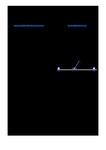Gain scheduling for state space control of a dual-mode inverted pendulum
| dc.contributor.author | Alvarez-Hidalgo, L | |
| dc.contributor.author | Howard, Ian | |
| dc.date.accessioned | 2022-12-17T04:35:30Z | |
| dc.date.available | 2022-12-17T04:35:30Z | |
| dc.date.issued | 2022-05-26 | |
| dc.identifier.isbn | 9781665488525 | |
| dc.identifier.uri | http://hdl.handle.net/10026.1/20088 | |
| dc.description.abstract |
The aim of the paper is to present an inverted pendulum system that operates in two different modes. Firstly, it operates in a static balancing mode, during which the controller tries to keep the pendulum balanced during which the controller tries to keep the pendulum balanced and maintain the current position of the pendulum carriage. Secondly, it also operates in a velocity control mode, so that the carriage can move at a selective velocity while simultaneously maintaining pendulum balance. In order to realize these two modes of control we implement a state feedback controller and schedule gain depending on the selected mode of operation of the system. We first describe the design and construction of the system. We then perform state space analysis, build state feedback controllers designed as linear quadratic regulators (LQR), and run tests to examine the operation of the system whilst subjecting the pendulum to impulsive disturbances. In particular, we investigate differences in control behavior in static position mode and in velocity-controlled mode. We present the experimental results and discuss their implications. | |
| dc.format.extent | 39-46 | |
| dc.language.iso | en | |
| dc.publisher | IEEE | |
| dc.title | Gain scheduling for state space control of a dual-mode inverted pendulum | |
| dc.type | conference | |
| dc.type | Conference Proceeding | |
| plymouth.date-start | 2022-05-26 | |
| plymouth.date-finish | 2022-05-29 | |
| plymouth.volume | 00 | |
| plymouth.conference-name | 2022 International Conference on System Science and Engineering (ICSSE) | |
| plymouth.publication-status | Published | |
| plymouth.journal | 2022 International Conference on System Science and Engineering (ICSSE) | |
| dc.identifier.doi | 10.1109/icsse55923.2022.9947361 | |
| plymouth.organisational-group | /Plymouth | |
| plymouth.organisational-group | /Plymouth/Faculty of Science and Engineering | |
| plymouth.organisational-group | /Plymouth/Faculty of Science and Engineering/School of Engineering, Computing and Mathematics | |
| plymouth.organisational-group | /Plymouth/REF 2021 Researchers by UoA | |
| plymouth.organisational-group | /Plymouth/REF 2021 Researchers by UoA/UoA11 Computer Science and Informatics | |
| plymouth.organisational-group | /Plymouth/Users by role | |
| plymouth.organisational-group | /Plymouth/Users by role/Academics | |
| dcterms.dateAccepted | 2022-03-27 | |
| dc.rights.embargodate | 2022-12-23 | |
| dc.rights.embargoperiod | Not known | |
| rioxxterms.versionofrecord | 10.1109/icsse55923.2022.9947361 | |
| rioxxterms.licenseref.uri | http://www.rioxx.net/licenses/all-rights-reserved | |
| rioxxterms.type | Conference Paper/Proceeding/Abstract |


